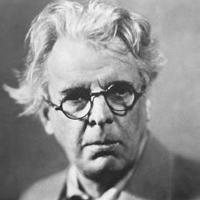The Second Coming by William Butler Yeats: Introduction
In The Second Coming poet's mind was filled with gloom in consequence of the side-spread murder and bloodshed in Ireland in the course of the Easter rebellion of 1916. The Irish civil war that followed the great war of 1914-1919 and various other events in Europe added to that gloom. The poem is the outcome of a state of mind troubled with ominous forebodings. The title of the poem suggests a new manifestation of God to man.

William B. Yeats (1865-1939)
The Christian era draws to its close; now that its 'great year' of two thousand years is ending. We do not know what the new shape of things will be but it must be terror-filled for us by virtue of the simple fact that it will entitle so revolutionary a change.
The poem is one of those few compositions which can be understood if we have some knowledge of Yeats’ philosophy of history. Yeats believed that history runs in cycle. He equates it with the motion of swiftly rotating gyres or cones. The gyres rotate rapidly round a fixed center. Their circumference widens as they rotate and at last disintegration sets in. The disintegration starts at the circumference and gradually involves the center as well.
Yeats believed that the present cycle of history began two thousand years ago with the birth of Christ. Prior to it here prevailed on the continent the Grecio-Roman civilization which began in 2000B.C. with the mating of god Zeus with Leda. As a sequel to this union, Helen, Castor, Pollex and Clytemnestra were born. The Greico-Roman civilization attained its climax about 1000 B.C. when Homer composed his two epics.
The Grecio-Roman civilization collapsed after enjoying a life span of 2000 years. Christ came and a new civilization was born out of the ashes of the earlier civilization. Likewise, the Christian civilization has nearly run its course of two thousand years, and hence, Yeats believes a second coming is imminent. History repeats itself, albeit with some difference. The present wheel of history has come full circle and a new civilization is coming into being. The birth of the new civilization may strike us the death of the old, its merits may seem to us horrifying, the very idea may be like a dreadful dream. But a change is positively coming and very likely the future is already being formed in some distant region.
Eventually, The Second Coming is based upon the cyclic philosophy of gyres and reincarnation but, allowance being made for this parable convention, can be taken as a direct prophecy of imminent disaster.
Cite this Page!
Sharma, K.N. "The Second Coming by William Butler Yeats: Introduction." BachelorandMaster, 5 June 2017, bachelorandmaster.com/britishandamericanpoetry/second-coming-introduction.html.
Related Topics
The Second Coming: Introduction
The Scholars: Critical Analysis
Sailing to Byzantium: Analysis
The Theme of Immortality in Byzantium Poems
A Prayer for My Daughter: Analysis
Among School Children: Analysis
Crazy Jane Talks with the Bishop
The Lamentation of the Old Pensioner
He Wishes for the Clothes of Heaven
An Irish Airman Foresees his Death
When You Are Old: Summary and Analysis
William Butler Yeats as a Symbolist
Truth of Human Life in Yeats's Poetry
Yeats and the Romantic Tradition
The Salient Features of Yeats's Poetry
Biography of William Butler Yeats
 |
bachelorandmaster.com |